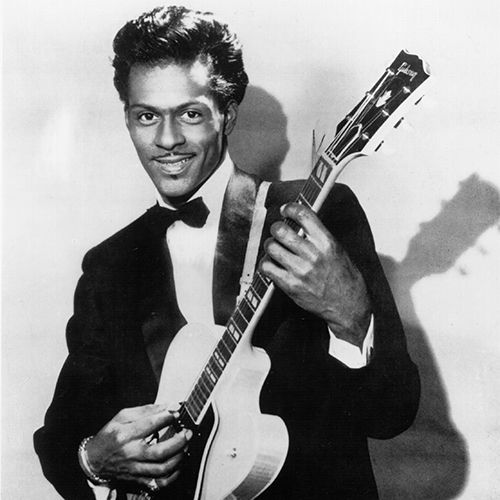In 1958, Chuck Berry introduced the world to “Johnny B. Goode,” a rock ‘n’ roll anthem that has since become one of the most iconic songs in the history of popular music. With its infectious guitar riff, energetic rhythm, and captivating storytelling, the track celebrates the spirit of musical ambition and the power of rock ‘n’ roll to inspire and transcend boundaries.
“Johnny B. Goode” opens with Berry’s electrifying guitar intro, instantly grabbing the listener’s attention with its dynamic energy and irresistible groove. The song’s driving rhythm and infectious melody create a sense of excitement and anticipation, inviting listeners to join in the journey of its charismatic protagonist.
The lyrics of “Johnny B. Goode” tell the story of a talented young musician from a humble background, whose ambition and determination propel him to stardom. With lines like “Deep down Louisiana close to New Orleans, way back up in the woods among the evergreens,” Berry paints a vivid picture of Johnny’s journey from obscurity to fame, capturing the imagination of generations of listeners.

Berry’s vocal delivery on “Johnny B. Goode” is brimming with charisma and confidence, perfectly complementing the song’s upbeat tempo and infectious energy. His distinctive guitar playing, characterized by its crisp, staccato phrasing and innovative use of double stops, further cements the song’s status as a rock ‘n’ roll classic.
“Johnny B. Goode” was a commercial success upon its release, reaching the top of the charts and solidifying Chuck Berry’s reputation as one of the founding fathers of rock ‘n’ roll. Its enduring popularity has led to numerous covers and adaptations by artists across genres, further cementing its status as a timeless anthem of musical ambition and innovation.
In conclusion, “Johnny B. Goode” by Chuck Berry is more than just a song; it’s a rock ‘n’ roll masterpiece that celebrates the spirit of musical ambition and the power of music to inspire and uplift. With its infectious guitar riff, energetic rhythm, and captivating storytelling, the song continues to resonate with audiences of all ages, reminding us of the enduring legacy of Chuck Berry and the transformative power of rock ‘n’ roll. As we listen to “Johnny B. Goode,” we are reminded of the timeless appeal of music as a force for creativity, expression, and empowerment









